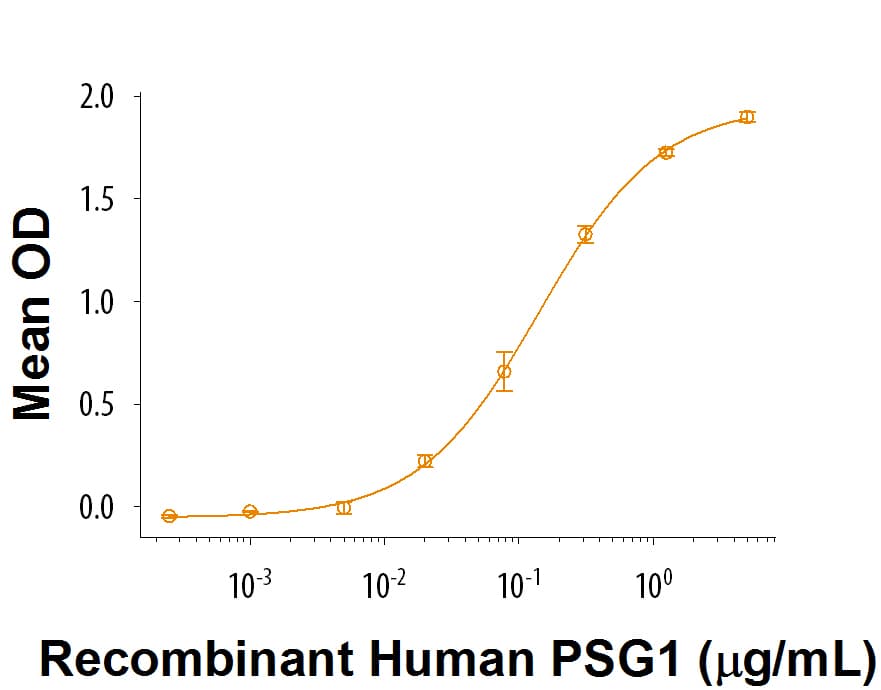 全部商品分类
全部商品分类

 下载产品说明书
下载产品说明书 下载SDS
下载SDS 用小程序,查商品更便捷
用小程序,查商品更便捷


 收藏
收藏
 对比
对比 咨询
咨询Scientific Data
 View Larger
View LargerWhen Recombinant Human SLITRK5 (Catalog # 2587-SK) is coated at 500 ng/mL, Recombinant Human PSG1 (Catalog # 9334-P1) binds with an ED50 = 50-300 ng/mL.
Carrier Free
CF stands for Carrier Free (CF). We typically add Bovine Serum Albumin (BSA) as a carrier protein to our recombinant proteins. Adding a carrier protein enhances protein stability, increases shelf-life, and allows the recombinant protein to be stored at a more dilute concentration. The carrier free version does not contain BSA.
In general, we advise purchasing the recombinant protein with BSA for use in cell or tissue culture, or as an ELISA standard. In contrast, the carrier free protein is recommended for applications, in which the presence of BSA could interfere.
9334-P1
| Formulation | Lyophilized from a 0.2 μm filtered solution in PBS with trehalose. |
| Reconstitution | Reconstitute at 500 μg/mL in PBS. |
| Shipping | The product is shipped at ambient temperature. Upon receipt, store it immediately at the temperature recommended below. |
| Stability & Storage: | Use a manual defrost freezer and avoid repeated freeze-thaw cycles.
|
Recombinant Human PSG1 Protein, CF Summary
Product Specifications
Gln35-Pro419, with a C-terminal 6-His tag
Analysis

Background: PSG1
Pregnancy-specific beta-1-glycoprotein 1 (PSG1), also called SP1, PSG1 or B1G1 and designated CD66f, is a secreted glycoprotein of the human PSG family within the CEA (carcinoembryonic antigen) superfamily (1-3). PSG1 shares 84-91% amino acid (aa) sequence identity with the most similar family members, PSG3, 4, 6, 7, and 8. Mature PSG1 contains a V-type Ig-like domain that is important for adhesion (N1), and three C2-type Ig-like domains (A1, A2 and B2). Three potential isoforms vary at the extreme C-terminus. Although rodents express pregnancy-specific glycoproteins, identity with human PSG proteins is low and limited to the N1 domain (3). PSG1 is one of the most abundant fetal proteins found in maternal blood during pregnancy. It is secreted by syncytiotrophoblasts and exerts proangiogenic effect by inducing VEGF-A secretion and formation of tubes in endothelial cells (4). PSG1 also serves an immunomodulatory function through
up-regulation of TGF-beta in macrophages, monocytes, and trophoblasts (5). In addition PSG1 has been shown to induce secretion of anti-inflammatory cytokines
IL-10 and IL-6 in human monocytes (6). PSG1 binds Integrin alpha IIb beta 3 and inhibits platelet-fibrinogen interactions (7). Recent studies also suggest PSG1's involvement in cancer biology and correlation with chemotherapy resistance in breast cancer (8).
- Watanabe, S. and J.Y. Chou (1988) J. Biol. Chem. 263:2049.
- Leslie, K.K. et al. (1990) Proc. Natl. Acad. Sci. USA 87:5822.
- McLellan, A.S. et al. (2005) BMC Evol. Biol. 5:39.
- Lisboa, F. et al. (2011) J Biol Chem. 286:7577.
- Ha, C. et al. (2010) Biol Rep. 83:27.
- Snyder, S. et al. (2001) Am J Reprod Immunol. 45:205.
- Shanley D. et al. (2013) PLoS One. 8:e57491.
- He, D. et al. (2016) Clin Sci (Lond). 130:2267.


参考图片
WhenRecombinant Human SLITRK5 (Catalog # 2587-SK) is coated at 500 ng/mL,Recombinant Human PSG-1 (Catalog # 9334-P1) binds with an ED50 = 50-300 ng/mL.




